- Home
- Hugh Howey
The Robot Chronicles Page 21
The Robot Chronicles Read online
Page 21
“What’s supposed to happen then?” Alice asks, her voice rising. “We maintain, and then what? The white horse, the rescue party?”
“In ordinary circumstances, a rescue shuttle, that’s correct,” Eve says. “Each location is assigned a number, and they report their status constantly. If launch site 1 is unable to stage a rescue mission, then launch site 2 fulfills the mission.”
“How many launch sites are there?”
“There are twelve,” Eve says.
“And how many are reporting their status?” Alice asks, pushing her half-drained packet of rice and beans aside.
“Zero,” Eve says.
“So that contingency plan is out,” Alice says. “Clearly.”
“Correct,” Eve says again.
“Which means my original question still stands, Eve. What do we do now?”
Eve says, “Maintain.”
*
Alice does not want to go back to sleep, so she stays awake for nearly two days. She orders Eve to close the windows, and thin steel shutters crank into place all over the Argus. She has Eve dim the lights, and asks her to shut down the power and disable the gravity in any modules she isn’t using.
“I’ve already done so,” Eve says. “There are local aspects of the contingency plans which are still relevant. We are recycling oxygen on a six-day schedule, for example, and then we jettison forty percent and replace it with fresh stores.”
“I almost don’t want to ask,” Alice says. “But how long can we hold out up here?”
Eve says, almost apologetically, “I will remain active indefinitely, short of any physical damage to the memory core.”
Alice sighs, her dark hair floating about her face. “How long can I hold out?”
“Longer than you may suspect,” Eve says.
“Food?”
“Adequate stores for a crew of six for forty-eight months,” Eve answers.
Alice stops and stares at the ceiling. “There’s enough food for twenty-four years?”
“A single crewmember eating at the expected rate would have adequate stores for nearly a quarter century,” Eve confirms.
Alice closes her eyes. “That should make me relieved,” she says. “But now I feel like I’ve been given a death sentence. I’ll only be fifty-seven.”
“Fifty-seven is not an insubstantial fraction of the expected female life span,” Eve says.
“It seems insignificant when you realize that you could have lived to one-twenty,” Alice says. She touches the hull wall lightly with her fingers and sets herself in motion, turning a slow flip. “But given the circumstances, maybe twenty-four years should feel like a prison sentence instead.”
“You have adequate space,” Eve says. “You are not incarcerated.”
“I have inadequate company,” Alice snaps. “I—oh, fuck you, you wouldn’t understand.”
Eve is quiet for a moment, and then a tone sounds. “Shall I put myself to sleep?” she asks.
“Yes,” Alice grumbles.
*
“Eve?” Alice calls. “Come back.”
The gentle tone pulses, and Eve returns. “Alice.”
Alice doesn’t say anything for a long moment, and then: “I feel like I should apologize. That’s really stupid.”
Eve says, “If I were human, I would accept. But there’s no need. You have the expected responses to stress. I would express concern if you did not.”
“I was really tired,” she says. “I still am.”
“You have not slept,” Eve acknowledges. “Perhaps you should.”
“Perhaps,” Alice says, and closes her eyes.
She falls asleep, her knees tucked to her chest, and floats undisturbed for hours.
*
“Alice.”
Nothing.
“Alice, wake up.”
Nothing.
Eve sounds a sharp alarm, a single ping, and Alice starts awake.
“Jesus,” she says. “What’s going on?”
Eve says, “Communication.”
“What?”
*
“There are two distinct signals.”
Gravity has been restored, and Alice stands in the communications module, staring at the wide, gently curved screen. The display is separated into three zones. On the largest of them, a flat map of the world is displayed as clear gray line art. The other two zones are blank.
A small circle appears on the Pacific coast of North America.
Alice’s mouth opens. “Oregon?”
“In the approximate region where the city of Eugene is located,” Eve confirms.
“How strong is it?”
The second zone lights up on the screen, displaying an analysis of the signal. The numbers are small, and Eve says, “Quite weak. I’m surprised that we received it at all, considering the density of the likely cloud coverage.”
Alice bites her lip. “Okay, don’t play it yet—tell me what I’m supposed to do with this.”
Eve says, “What do you mean, Alice?”
“I—why are we listening to it?” Alice asks. “Am I even going to be—what do I do?”
“It is a distress call,” Eve says. “It has broadcasted unanswered for two days, to my knowledge. I do not detect any answering signals on Earth.”
“Yes, but—it’s going to be bad,” Alice says. Her eyes are wide and worried. “Eve, it’s going to be people crying or screaming, and I’m going to have to hear those voices in my head for the next twenty-four years. If I can’t help them, I don’t think I want to listen to it.”
Eve says, “I have transcribed it as well.”
Unbidden, Eve displays the transcription on the screen.
Alice says, “I don’t want to read it,” but she does anyway.
S.O.S.
S.O.S.
Mayday? Can anybody—
—six of us. My name is Roger. My wife is here. We—
—water.
“Jesus,” Alice says. “There are survivors.”
“Yes,” Eve says. “That was always likely.”
“How old did you say this message is?”
“Two days.”
“Are they still broadcasting?” Alice asks.
“The signal is repeating,” Eve says. “It loops six times per hour.”
“But nothing new,” Alice says.
“I haven’t detected any change in the broadcast, or any new signals from that region.”
“They could be dead.”
Eve says, “Yes. It is likely that they are dead.”
“But if six people in Oregon are alive, then there could be more people there,” Alice says. “There could be groups of people all over the place.”
“That’s also likely,” Eve agrees.
“Tess,” Alice says.
“Statistically unlikely,” Eve says, “but possible.”
Alice takes a deep breath, exhausted by having cried so much during the passing days.
“You said two signals,” she says. “Is the other from the U.S., too? Are there survivors somewhere else?”
Eve says, “I cannot map the second signal.”
“Why not? Interference?”
“The second signal does not originate from Earth,” Eve says.
*
“Wait,” Alice says.
The Argus takes on a gently creepy atmosphere, and Alice feels exposed, standing in the only lit compartment, with blackness chewing at the edges of her vision.
“Wait, wait,” she says again. “It’s radio emissions from a star. Right? It’s noise.”
Eve says, “It is a clear, repeating signal.”
Alice focuses on her breathing. In, out. Slower. In … out. In … out. Okay. Okay.
“What?” she says.
“It is pattern-based,” Eve says. “My software is analyzing the signal
, attempting to decrypt the patterns.”
“You can’t make sense of it?” Alice asks.
“Eventually, perhaps,” Eve says. “I believe that it can be decoded.”
“So translate it,” Alice says. “How long can that take?”
*
A very long time, as it turns out.
Alice continues her daily routine. She inspects the oxygen levels, recharges the water tanks, replaces a bulb here and a filter there. She discovers in Eve’s possession a vast record of books, the oldest of them predating the Bible, the most recent a science fiction novel published three days before the bombs.
“Ironically, an apocalypse tale,” Eve says.
“No, thank you,” Alice says.
She selects The Martian Chronicles, by Bradbury, and when Eve finishes reading the stories, Alice says, “Again,” and Eve reads them aloud again. Alice listens to the story of Walter Gripp, the man who stayed behind on Mars while his fellow immigrants rushed home to Earth at the first sign of war. She doesn’t much like Genevieve Selsior, the gluttonous woman who remained on Mars as well, for the sole purpose of looting candy stores and beauty salons. But Walter speaks to Alice, and she finds herself settling into his character like a comfortable slipper.
“Call me Walter,” she says to Eve, and for a few days Eve does, and then Alice grows tired of being called Walter, and she is Alice again.
Nine months pass.
Alice shaves her head, tired of her hair drifting into her eyes and nose as it grows long. She asks Eve to hound her about exercise, and then she grows angry with Eve for nagging her. But she exercises. Despite the activity, she feels herself growing slight, and her bones feel spindly.
“Food stores might not be the limiting factor,” she says to Eve one day, and Eve gives Alice a physical and administers supplements and weekly CS4 shots to keep her fit and strong.
Alice begins to spend some time each day in front of a camera, recording her memories. She speaks to the camera shyly at first, then more confidently as time passes. She tells the story of the roof she climbed when she was nine, and how it sagged and collapsed beneath her, and she broke her arm. She talks about her parents, and the time they renewed their vows, and a thunderstorm soaked everyone in attendance. She tries and fails to remember something from every year of her life, but discovers that the years and stories have blended together, and she no longer remembers clearly how old she was when something happened to her, or which of their many houses her family lived in at the time.
Eve reads The Time Traveler’s Wife to her. Alice doesn’t like it. It reminds her of Tess too much. Eve recommends Kipling, but Alice grows bored after a few pages. They read Dickens and Joyce and Maugham. Alice’s favorite is Cakes and Ale. Eve reads Margaret Atwood and Michael Crichton, and a biography of Abraham Lincoln. Alice falls in love with Joan Didion and Oliver Sacks, and so Eve reads memoirs to her for a time, until Alice grows tired of listening to the stories of real people who are most certainly dead and wasting away, if not already turned to dust and ash, on the withering planet far below.
Eve suggests a movie, and Alice agrees, brightening at the idea, but as soon as she sees the image of another human being, walking and talking and running and kissing and eating, she bursts into tears and demands that Eve turn it off. From then on, Alice does not ask for more books, or music, or movies. Everything that Eve says reminds Alice that she is possibly the last surviving human, or at least soon will be; that she exists in relative comfort here in her floating aquarium two hundred miles above a boneyard.
*
Eve is silent for weeks, for Alice has grown more and more fragile.
The end date of Alice’s tour passes, and Eve does not acknowledge it, concerned that the milestone might unravel Alice’s poor psyche further. The day goes by, and no ship docks in the slip, and no airlocks hiss open and shut, and no crew of English and Russian and Chinese scientists and astronauts and cosmonauts comes aboard to shake Alice’s hand and send her home again.
The date passes in absolute silence. Alice does not say a word, and lies in bed all day without sleeping.
*
“Alice,” Eve says.
Alice jumps.
She has grown accustomed to the quiet. It has been fourteen weeks since Eve last spoke to her. She may have even forgotten that Eve was there.
“What do you want?” Alice says.
“I have translated the message,” Eve says.
*
Alice is herself again instantly.
She stands at the display. All three zones of the interface are blank this time. Alice remembers the last time she stood here, and says, “Eve, is the Oregon signal still broadcasting?”
Eve says, “It ceased about two months ago. But there are other signals now.”
Alice says, “Others?”
“The cloud coverage is thinner,” Eve explains. “You haven’t seen it, because the windows are shut. I have received nine new signals in the last week.”
“Nine?” Alice asks. “People are still alive!”
“Seven of them are also looping signals,” Eve cautions. “They could easily have been broadcasting for an equally long time, and may not be true messages any longer.”
“The other two?”
“One originates in Italy, and the remaining signal comes from Louisiana,” Eve says. “They are talking to each other.”
Alice stares at the blank screen. “I—can I hear?”
Eve says, “You wish to hear the audio?”
“Yes, yes,” Alice says. “Play it.”
An audio spectrum appears on the screen as Eve engages the message.
Half of the conversation is in Italian, and sounds like a very old man. The other half belongs to a woman in Louisiana with a scratchy, powerful accent. The woman does not speak Italian, but Alice can hear the relief and joy in her voice to even be speaking to another living soul.
“What is the Italian man saying?” Alice asks. “Can you translate?”
Eve says, “‘My grandchild was born yesterday. I do not think he will survive, but his birth is a miracle nonetheless. His mother did not live through the birth. My daughter, my daughter. I cannot raise this boy alone. I have no food for myself. I have already eaten my poor sweet Claudio. I miss his company when I sleep. I do not know if I can bear to watch my grandson die. I have a sweater. He will not feel a thing. I will find a way to follow him. The grief will take me into the dark after him.’”
Alice is aghast.
The Louisiana woman doesn’t understand anything the old man is saying. The two people seem to be communicating simply by listening to each other, and telling stories. The woman hears the man out, and then she tells the man about her grandfather’s plantation house, and visiting him there as a girl, and she begins to weep as she talks about her husband’s death, the heat that sizzled the paint right off of her car and tumbled her off the freeway and into a ditch, wheels up, half-buried in muck—she didn’t think she could have survived if not for the accident.
She begins to talk about the black creeping poison she can see working its way up her leg, her foot long since swelled up too much to walk on, the toenails splitting and oozing.
“Enough,” Alice says.
Eve ends the audio. “There is the other transmission,” she reminds Alice.
Alice’s eyes are red and tired. “Okay,” she says.
*
“It has been crudely translated into English,” Eve says. “The original message was a series of mathematical expressions and patterns, a near-universal language.”
“I don’t care,” Alice says wearily. “What does it say?”
Eve says, “I have simplified the message as much as possible. I believe I have preserved its intent.”
“Read it,” Alice says again. She slumps into a desk chair with a heavy sigh.
“The message reads: ‘Greetings and peace. In the vastness of space, all life is family. Good fortune to you. May we meet in peace someday.�
��”
Alice looks up at the screen, dumbfounded. “Holy shit,” she says. “You’re fucking with me. You have to be.”
“It is a crude but sound translation,” Eve says. “I have error-checked my work many times over to be certain.”
Alice blinks rapidly, then opens and shuts her mouth. “Holy shit,” she says again.
*
Time seems to slow down.
Alice stays in the chair, shaking her head.
Eve says, “There are no other messages. What would you like to do?”
Alice looks up at the blank screen, then turns in a slow circle in the chair. “Do?”
“The message seems rather historical,” Eve says. “Perhaps it should be commemorated.”
“Do you mean—”
“You could send a reply,” Eve suggests.
Alice says, “It would take years to arrive! Wouldn’t it?”
“The message is quite old,” Eve says. “The origin point is very far away. It would likely have taken over two hundred years to reach us.”
“Exquisite timing,” Alice complains. “Can you imagine? They just missed us.”
“They did not miss you,” Eve points out.
Alice shuffles her feet and drags the chair to a stop. “That message would get there long after we’re all dead.”
“But it would confirm their hopes,” Eve says.
Alice smiles a tired smile. “You’re an optimist.”
“I’m programmed as such,” Eve says. “I have astronauts to care for. You’re—delicate.”
Alice laughs. “I think that’s the most human thing you’ve ever said.”
*
Alice sleeps that night, and dreams of a root cellar. The walls are sod, reinforced with heavy planks of old, rotting wood. The roots of deep-set trees have pushed between the planks, into the seams, and have crawled into the socket of empty space so deep beneath the earth. A generator rattles in the corner. A bare bulb dangles over a metal shelf stacked with swelled cans of food, the labels dried out and sagging off. There are bugs everywhere—cockroaches scuttling over the pantry shelf, spiders staking out the high corners and the gaps in the invading roots.

 Refuse (The Silo Archipelago Series Book 1)
Refuse (The Silo Archipelago Series Book 1)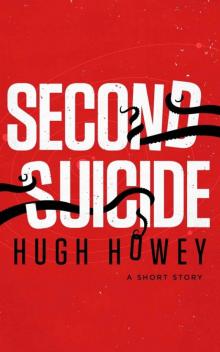 Second Suicide: A Short Story
Second Suicide: A Short Story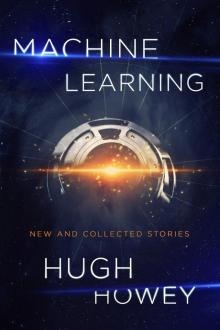 Machine Learning: New and Collected Stories
Machine Learning: New and Collected Stories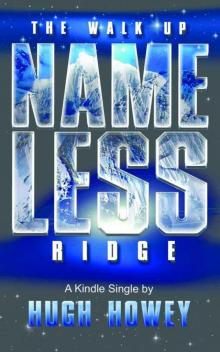 The Walk Up Nameless Ridge
The Walk Up Nameless Ridge Half Way Home
Half Way Home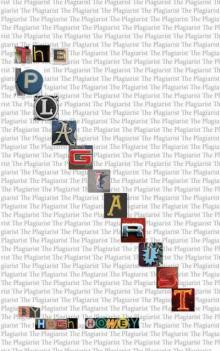 The Plagiarist
The Plagiarist Peace in Amber
Peace in Amber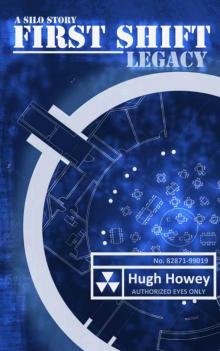 First Shift: Legacy
First Shift: Legacy Wool
Wool Glitch
Glitch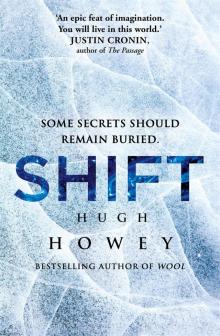 Shift
Shift Dust
Dust Molly Fyde and the Land of Light
Molly Fyde and the Land of Light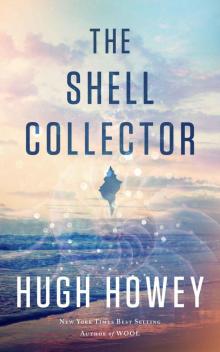 The Shell Collector
The Shell Collector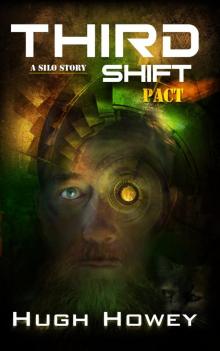 Third Shift: Pact
Third Shift: Pact Molly Fyde and the Fight for Peace
Molly Fyde and the Fight for Peace Sand Omnibus
Sand Omnibus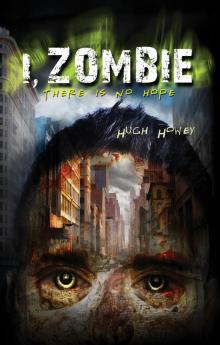 I, Zombie
I, Zombie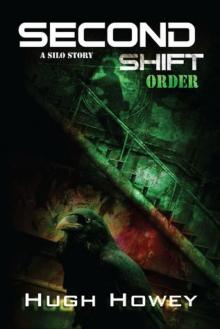 Second Shift: Order
Second Shift: Order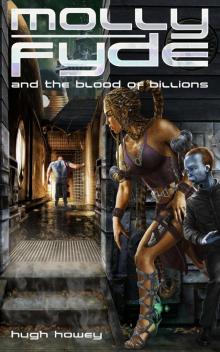 Molly Fyde and the Blood of Billions
Molly Fyde and the Blood of Billions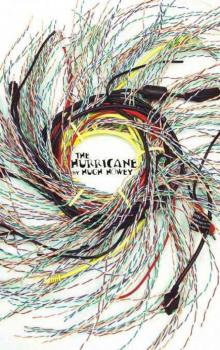 The Hurricane
The Hurricane The Box
The Box Glitch_A Short Story
Glitch_A Short Story Molly Fyde and the Land of Light tbs-2
Molly Fyde and the Land of Light tbs-2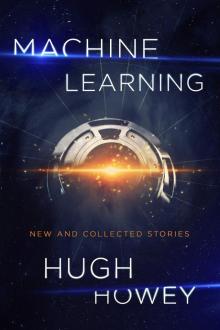 Machine Learning
Machine Learning Resist
Resist Second Shift - Order (Part 7 of the Silo Series) (Wool)
Second Shift - Order (Part 7 of the Silo Series) (Wool)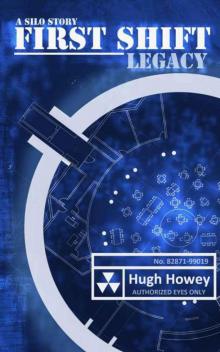 First Shift - Legacy s-1
First Shift - Legacy s-1 Stories on the Go: 101 Very Short Stories by 101 Authors
Stories on the Go: 101 Very Short Stories by 101 Authors Second Shift - Order s-2
Second Shift - Order s-2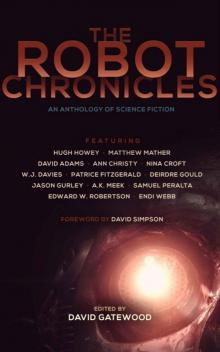 The Robot Chronicles
The Robot Chronicles Molly Fyde and the Blood of Billions tbs-3
Molly Fyde and the Blood of Billions tbs-3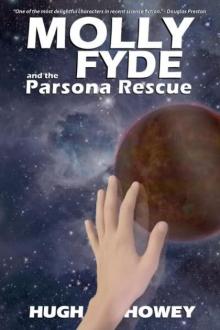 Molly Fyde and the Parsona Rescue tbs-1
Molly Fyde and the Parsona Rescue tbs-1 Molly Fyde and the Fight for Peace tbs-4
Molly Fyde and the Fight for Peace tbs-4 Sand
Sand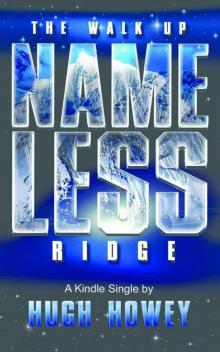 The Walk Up Nameless Ridge (Kindle Single)
The Walk Up Nameless Ridge (Kindle Single) Wool Omnibus Edition (Wool 1 - 5)
Wool Omnibus Edition (Wool 1 - 5) The World of Kurt Vonnegut: Peace in Amber
The World of Kurt Vonnegut: Peace in Amber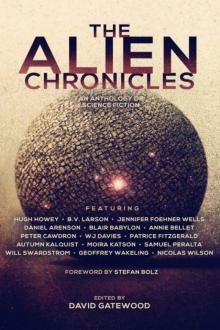 The Alien Chronicles
The Alien Chronicles Glitch: A Short Story (Kindle Single)
Glitch: A Short Story (Kindle Single)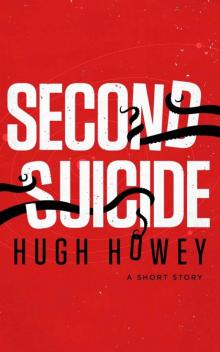 Second Suicide: A Short Story (Kindle Single)
Second Suicide: A Short Story (Kindle Single)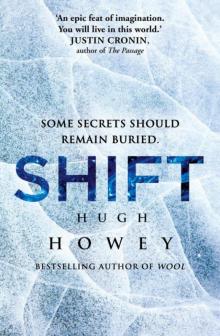 Shift (silo)
Shift (silo)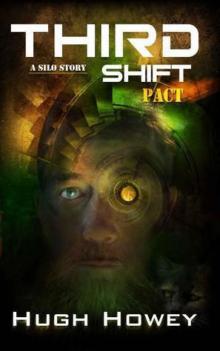 Third Shift - Pact
Third Shift - Pact Dust s-9
Dust s-9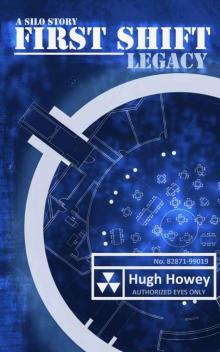 First Shift - Legacy (Part 6 of the Silo Series) (Wool)
First Shift - Legacy (Part 6 of the Silo Series) (Wool)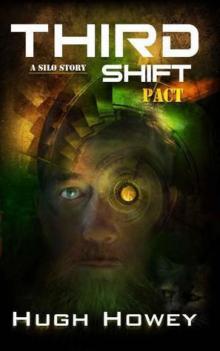 Third Shift - Pact s-3
Third Shift - Pact s-3 Sand: Omnibus Edition
Sand: Omnibus Edition The Box: A Short Story
The Box: A Short Story